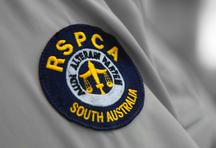Rodeo should not go ahead with 40C forecast
December 28, 2019RSPCA SA urges organisers of Carrieton rodeo in far north to cancel event
RSPCA South Australia is shocked that Carrieton rodeo organisers have not postponed this evening’s event, despite today’s forecast for Carrieton to reach 40 degrees and remain around 36 by 6.30pm, the rodeo’s start time.
Carrieton, situated north of Orroroo, is among South Australia’s far north towns that have sweltered for weeks in extreme high temperatures. The highest recorded temperatures have been above 37C for more than ten days, with a top temperature of 46C recorded on December 19.
RSPCA South Australia has received several complaints from members of the public concerned that the rodeo is proceeding during the current heatwave. RSPCA South Australia’s Animal Welfare Advocate, Dr Rebekah Eyers, said the community is very aware of the animal welfare risks associated with heatwaves and expects animal based entertainment to be cancelled when extreme temperatures are forecast.
“In the past few weeks during heatwave conditions in South Australia, we have seen all three racing codes – GRSA, HRSA and TRSA – cancel and reschedule greyhound, harness and horse races in response to forecast scorching temperatures,” Dr Eyers said.
RSPCA South Australia contacted the organisers of the APRA (Australian Professional Rodeo Association) Carrieton rodeo seeking information on APRA’s heat policy and urging them to cancel the event. It was advised APRA has no heat threshold policy that stops events taking place in extreme heat. It is left to the rodeo organisers’ discretion to determine what steps will be taken to mitigate harm to animals being kept in yards, handled and forced to perform in extreme heat.
RSPCA SA’s concerns with this event include:
- The handling and transport of animals to Carrieton during the heat of the day, risking heat stress
- The yarding of animals with insufficient shade, risking heat stress
- The physical exertion and associated stress (including heat stress) while confined in the chutes and during their time in the arena, including the use of aversive equipment – spurs, flank straps and occasionally (in the chutes) electric prods
“Research shows the aversive equipment routinely used on rodeo animals, such as flank straps and spurs, cause them to suffer fear and anxiety as they are provoked to exhibit extreme bucking for the entertainment of a crowd,” Dr Eyers said.
“So trucking animals to a rodeo, in extreme heat, prior to the event, then forcing them – in still high temperatures – to perform in ways that put them at risk of injury just compounds the stress.
“And although SA regulation requires a vet to attend rodeos, there is no requirement for a report to be submitted to regulators following the event.
“This makes it difficult, if not impossible, to know, after this rodeo ends, the extent to which the animals’ welfare has been compromised.
“In the forecast conditions, it’s likely some animals will suffer heat stress but it will be difficult to verify how many have suffered or to what extent. And with no report submitted to RSPCA after the event, it’s unlikely we will be informed of any injuries or other welfare problems that occur during this evening’s event.
“To demonstrate that animal welfare is a priority, we had hoped APRA and event organisers would follow the lead of other organisations using animals for entertainment, and cancel or reschedule the event.
“We urge APRA to adopt a heat threshold/extreme weather policy in response to the increasing likelihood of heatwaves across Australia.”
Background Information:
Rodeos are still legal in South Australia.
There is no legally enforceable threshold temperature, above which animals cannot be forced to perform in rodeos.
Neither the SA regulations pertaining to animal welfare at rodeos nor APRA’s own animal welfare documents contain enforceable, mandatory standards to respond to extreme weather events.
Due to animal welfare concerns, rodeo events (including bull riding) are illegal in the UK and the ACT and there is a growing push to ban them in other jurisdictions as well.
A growing body of research suggests rodeo animals suffer significant anxiety and stress, especially in response to the aversive implements used on them. And there is little, if any, research indicating animals “enjoy” bucking in front of screaming crowds.
Several US jurisdictions that prohibited the use of flank straps, spurs and/ or electric prods at their rodeos have seen rodeos close in their towns.
For more information about RSPCA’s position on rodeos:
https://kb.rspca.org.au/knowledge-base/what-are-the-animal-welfare-issues-with-rodeos/



